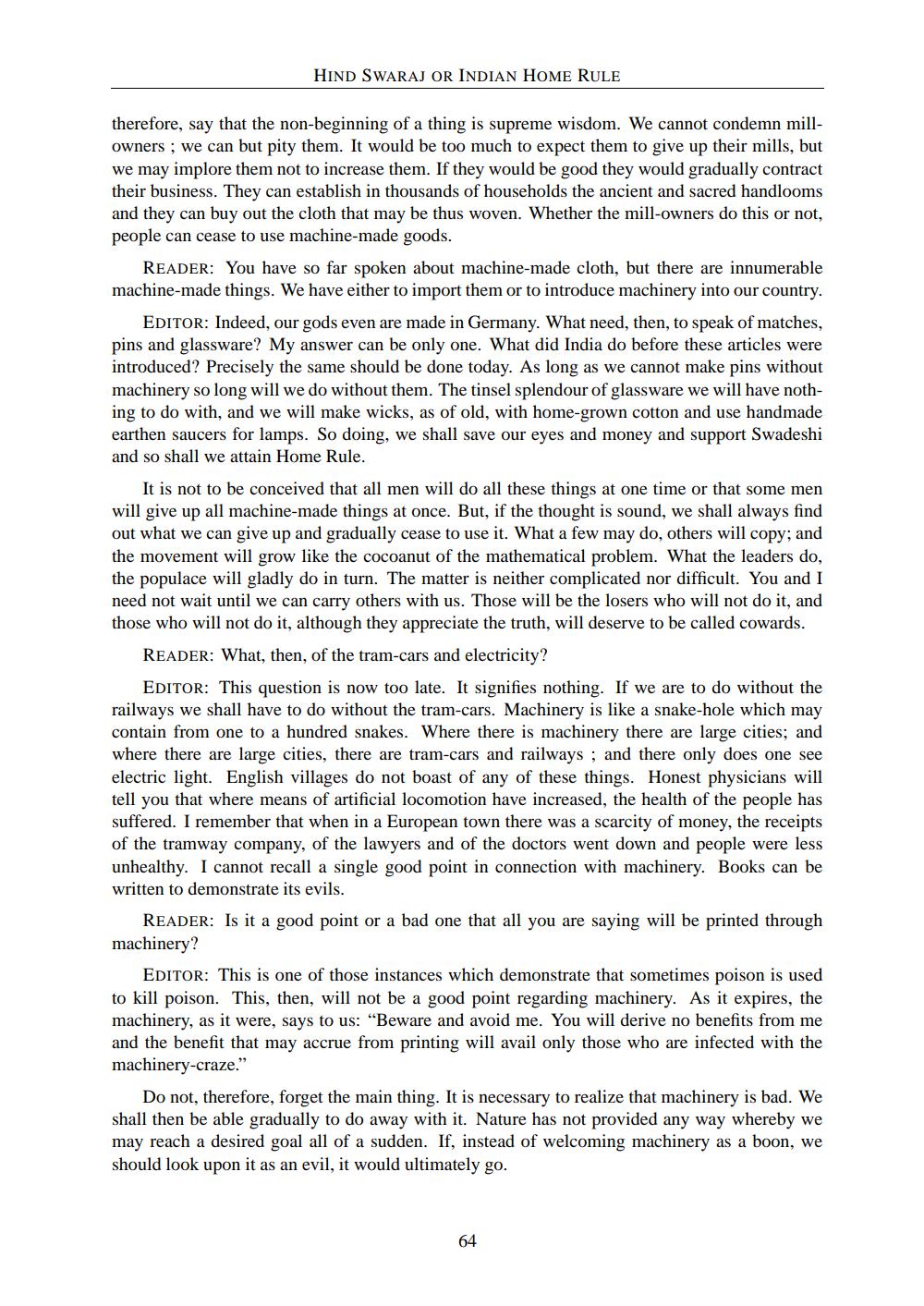________________
HIND SWARAJ OR INDIAN HOME RULE
therefore, say that the non-beginning of a thing is supreme wisdom. We cannot condemn millowners; we can but pity them. It would be too much to expect them to give up their mills, but we may implore them not to increase them. If they would be good they would gradually contract their business. They can establish in thousands of households the ancient and sacred handlooms and they can buy out the cloth that may be thus woven. Whether the mill-owners do this or not, people can cease to use machine-made goods.
READER: You have so far spoken about machine-made cloth, but there are innumerable machine-made things. We have either to import them or to introduce machinery into our country.
EDITOR: Indeed, our gods even are made in Germany. What need, then, to speak of matches, pins and glassware? My answer can be only one. What did India do before these articles were introduced? Precisely the same should be done today. As long as we cannot make pins without machinery so long will we do without them. The tinsel splendour of glassware we will have nothing to do with, and we will make wicks, as of old, with home-grown cotton and use handmade earthen saucers for lamps. So doing, we shall save our eyes and money and support Swadeshi and so shall we attain Home Rule.
It is not to be conceived that all men will do all these things at one time or that some men will give up all machine-made things at once. But, if the thought is sound, we shall always find out what we can give up and gradually cease to use it. What a few may do, others will copy; and the movement will grow like the cocoanut of the mathematical problem. What the leaders do, the populace will gladly do in turn. The matter is neither complicated nor difficult. You and I need not wait until we can carry others with us. Those will be the losers who will not do it, and those who will not do it, although they appreciate the truth, will deserve to be called cowards.
READER: What, then, of the tram-cars and electricity?
EDITOR: This question is now too late. It signifies nothing. If we are to do without the railways we shall have to do without the tram-cars. Machinery is like a snake-hole which may contain from one to a hundred snakes. Where there is machinery there are large cities; and where there are large cities, there are tram-cars and railways ; and there only does one see electric light. English villages do not boast of any of these things. Honest physicians will tell you that where means of artificial locomotion have increased, the health of the people has suffered. I remember that when in a European town there was a scarcity of money, the receipts of the tramway company, of the lawyers and of the doctors went down and people were less unhealthy. I cannot recall a single good point in connection with machinery. Books can be written to demonstrate its evils.
READER: Is it a good point or a bad one that all you are saying will be printed through machinery?
EDITOR: This is one of those instances which demonstrate that sometimes poison is used to kill poison. This, then, will not be a good point regarding machinery. As it expires, the machinery, as it were, says to us: "Beware and avoid me. You will derive no benefits from me and the benefit that may accrue from printing will avail only those who are infected with the machinery-craze."
Do not, therefore, forget the main thing. It is necessary to realize that machinery is bad. We shall then be able gradually to do away with it. Nature has not provided any way whereby we may reach a desired goal all of a sudden. If, instead of welcoming machinery as a boon, we should look upon it as an evil, it would ultimately go.
64




